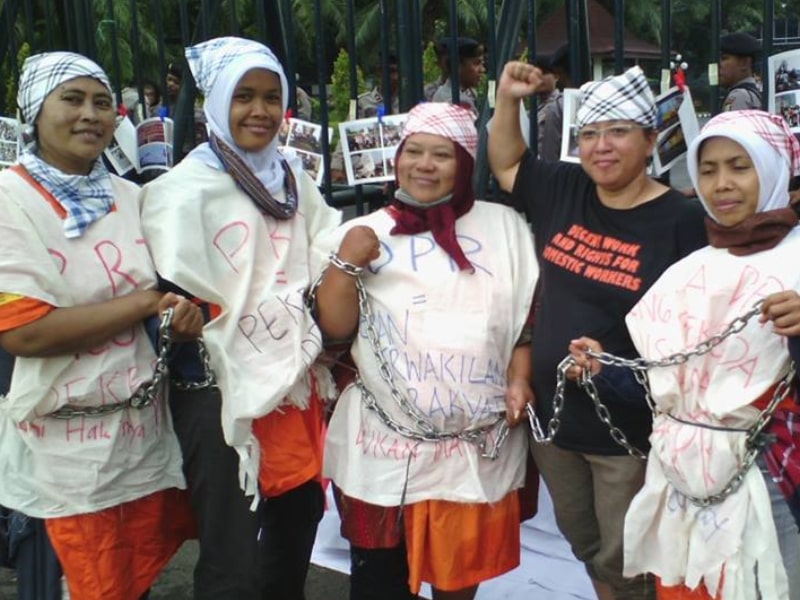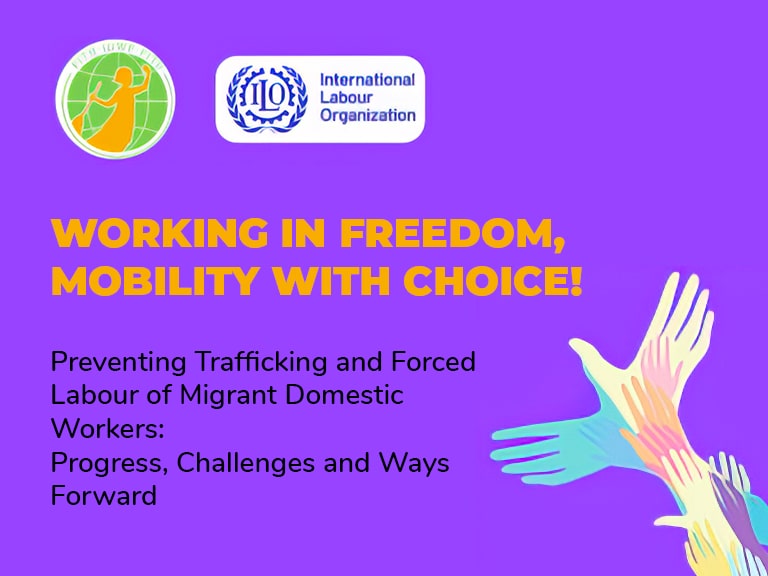- This event has passed.
Domestic workers hunger strike action in Indonesia
Indonesian Domestic workers Hunger Strike Action started from Nov 25 demanding for Protection Bill & the Ratification of ILO Convention 189 on Decent Work for Domestic Workers as a priority of the legislative initiative for 2015 & to be deliberated by the end of legislative period 2015-2019.
Details
Indonesian Domestic workers Hunger strike Action:
« TIDAKAKANDIAM » (We will not stay silent)
25 November 2014, Jakarta, Indonesia
Workers demand for Protection Bill & the Ratification of ILO Convention 189 on Decent Work for Domestic Workers as a priority of the legislative initiative for 2015 & to be deliberated by the end of legislative period 2015-2019.
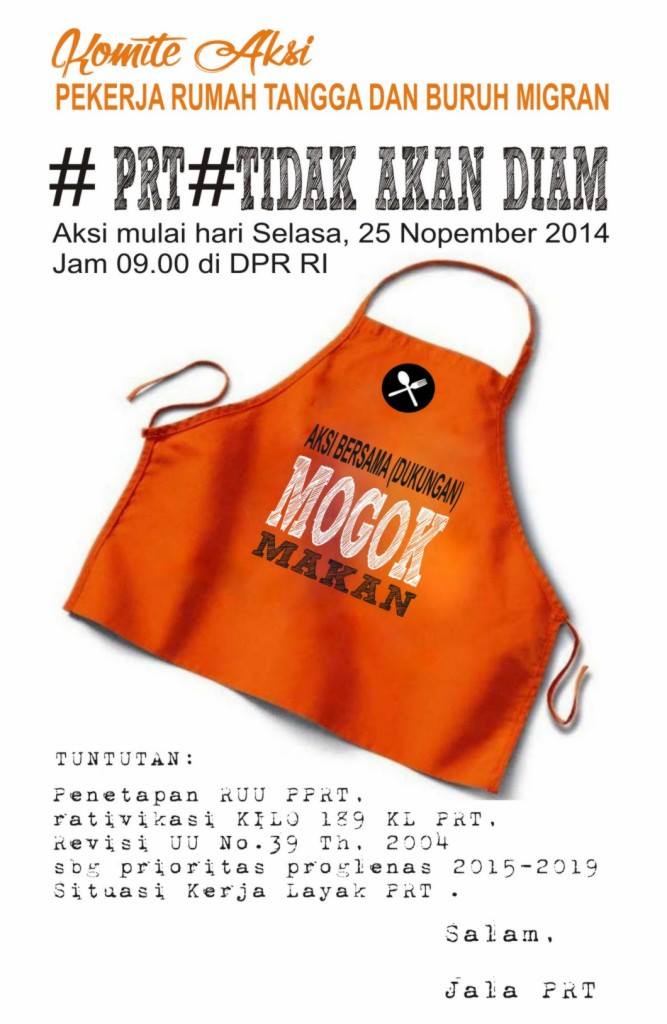
Photo: Kawan Upc/FACEBOOK
JALA PRT (National Advocacy Network for Domestic workers) and JBM (the Migrant Workers Network), are expressing disappointment about the bad performance of the House of Representatives.
It’s been two months the House of Representatives is characterise by conflict and dualism of leadership that unable the Parliament to work. This has led to a critical situation.
Until November 2014, the Parliament has not done major work as a Legislative Institution. While the first legislative session will expire in mid-December 2014 the Parliament has not yet decided about the National Legislation Program Priorities for the 2015 and for the period 2015-2019.
It has an impact on the discussion of the Draft bill on PRT (common name used for Domestic Workers) which should be discussed in parliament.
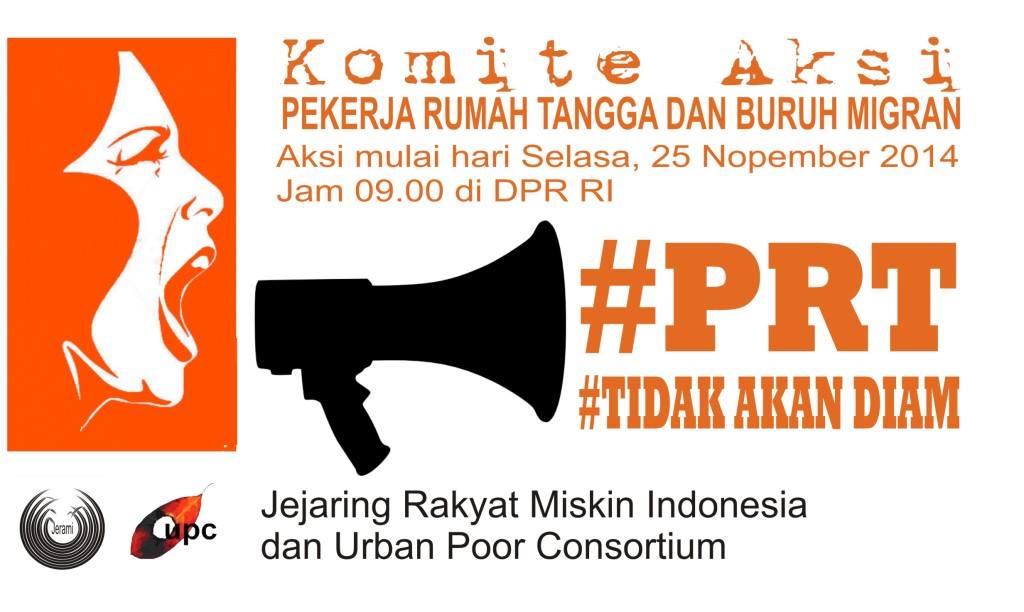
Photo: Kawan Upc/FACEBOOK
It’s been 10 year that the Parliament should draft, discuss and deliberate on PRT law.
The draft was first included in the House’s 2004-2009 list of national legislation programs (Prolegnas) but was never been discussed.
In 2009-2014 periods it was included in the list of priority but without satisfactory results.
The PRT Bill experiences again a step back because the discussion has to start from the beginning.
Do to the critical situation inside the House of Representatives we are concern that the PRT bill will experience tremendous setback.
The Hunger Strike action “TIDAKAKANDIAM” asks to the House of Representatives to put the PRT Bill as a priority inside the national legislative initiative for the period 2014-2019, we also demand that the discussion about the Bill will start at the beginning of 2015 and that the law will be voted by the end of the legislative period 2014-2019.
The hunger strike will be conducted by 4 domestic workers from Yogyakarta ( Jumiyem – Tunas Mulia DW Union; Sargini- Tunas Mulia DW Union; Ririn Sulastri – Tunas Mulia DW Union; Haryati – KOY) and by Lita Anggraini coordinator of JALA PRT (the domestic workers national network for advocacy).
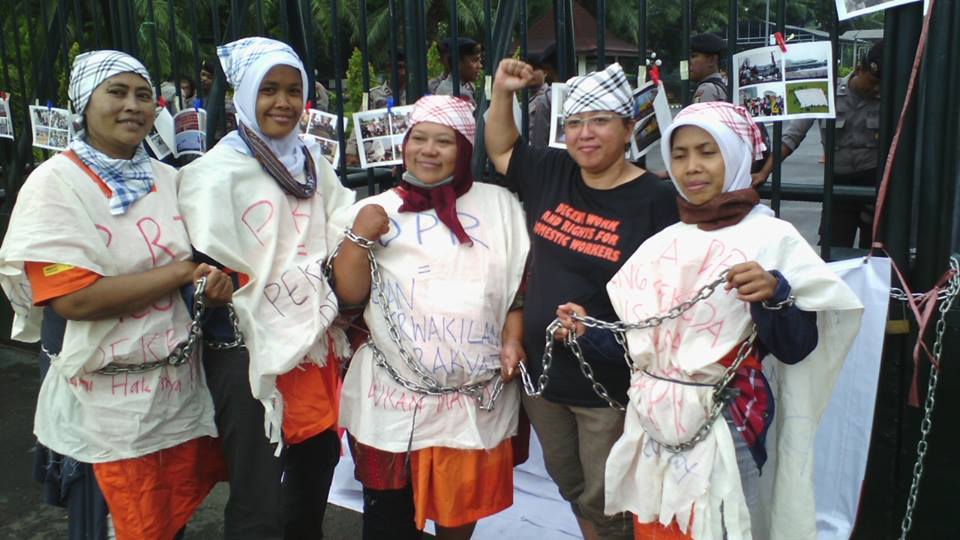
It will start on Tuesday, November 25th, 2014, (International day to end violence against women) in front of the Parliament building in Jakarta.
It will be supported by various women and civil society organizations through public events in the form of: cultural and political speeches, photo exhibitions, film screenings, monologues, poetry readings, discussions and musical performances.
The Hunger strike, the public events and the campaign “TIDAKAKANDIAM” want to persuade the members of the House of Representatives to immediately start working on the Bill and to deliberate it as it has been promised by numerous candidates during the Parliament legislative campaign.
The demands:
- The House of Representatives shall put the PPRT Bill to enter in National Legislations and Priorities 2015-2019
- Encourage transcription of the discussion on the protection of domestic workers in to a bill and ensure it’s ratified into law.
- The House of Representatives had to work hard to accelerate the discussion and the approval of the domestic workers Protection Act and the ratification of the ILO Convention 189. It should also ratify the revision on the Law 39, Year 2004 on PPTKILN.
The new Parliament must finalize its responsibility to put an end to all forms of slavery to the Domestic Workers (PRT).
The actions will be carry out until the law enter in the 2015 legislative Priority; without a formal statement by the Parliament the hunger strike will continue.
Beside the Hunger Strike and public activity a social media campaign will be enrolled we’re asking people to support Domestic Workers on Tweeter and Facebook with the #TIDAKAKANDIAM ( we will not stay silent) and the #PRT (Domestic Workers) and sharing the video of the campaign:
JALA PRT (ADVOCACY NETWORK NATIONAL DOMESTIC WORKERS):
Atma Solo, APAB, Asa Puan Pontianak, Living Water Flores, FSPSI Reform,
Institute for Women Bandung, ICM, Indonesian Women’s Coalition, Boats Women,
SA KPPD Surabaya, KOHATI HMI, Kongress Operata Yogyakarta,
LA Woman Damar Lampung, Lard Mataram, LBHP2I Makassar, LBH, LBH Jakarta,
LBH Bali, Partner ImaDei, Migrant Care, Ngadek Sodek Parjuga Madura, Snakes Jakarta, Palembang OWA, Paperta, Shield Semarang, Semarang Independent domestic Workers Union, Women Equator, Fatayat NU, Rifka Annisa, Race: Tjoet Njak Dien, Race: Echoes of Women, Friends of Women, SPEKHAM Solo, United PRT Tunas Mulia, broom, SAHDAR Medan,
School Female Ciliwung, SP Kinasih, Surabaya Child Crisis Center, Samarinda Suer, TURC, Kalyanamitra, Women’s Solidarity, JPPRT DIY (Worker Protection Network Household DIY),
With
FBLP, Women Mahardika, IMWU Netherland, IMWU Hong Kong, IFN Singapore, SBMI, ATKI
APPENDIX: Facts on PRT Bill
It’s been 10 years (years 2004-2014) the Domestic Workers law is discussed by members of the House of Representatives.
That coincides with the two term of the President Susilo Bambang Yudhoyono (SBY) and with two term of the House of Representatives during which no State responsibility has been taken on the working and living conditions of Domestic Workers.
The non activity of the Government and of the Parliament shows the incoherence between what has been supported on International level and what done on national level.
This particularly regard the former President statement at the 100th Session of the International Labour Conference in Geneva where it’s been discussed and voted by majority the ILO Convention 189 on Decent Work for Domestic Workers.( 16 June 2011)
On June 14, 2011, at the 100th Session of ILC, the President Susilo Bambang Yudhoyono delivers his speech and asserted that his Government will support the Convention on Decent Work for domestic workers. He expressed his commitment to ratify the ILO Convention No. 189 and promised to give better protection for domestic workers who work in the country and outside the country (migrants).
Three years after the President speech nothing has been done to protect the Domestic Workers and migrant domestic workers. The difficulties faced inside the Parliament show a weakness in the political will.
The Indonesian Constitution mandates that the State is obliged and responsible for the lives of its citizens. Supposedly every Indonesian citizen is entitled to the respect, protection and fulfillment of their rights whatever profession because every citizen has the freedom to choose a job and get their rights.
- Most domestic workers in Indonesia are women from rural areas who have very little education who migrates to big Cities.
- Domestic workers have consequently been marginalized, as they are often looked down on as second-class citizens.
- They are also prone to physical, social and sexual abuse. So far, domestic workers are not recognized as workers by the State and there is not policies concerning in anyway domestic workers.
- Reality shows that they are often victims of human rights violations. PRT are susceptible of a variety of physical, psychological, economic, social abuse.
- They are living and working in situations that are not worth even in a situation of slavery.
- Violations include: very low wages or not even payment, deferred payment, arbitrarily cutting of wages , there is not clear limit of workload, long working hours (until 16h), no day off, no leave and minimal access to socialize if DW lives with the employer.
- They are vulnerable to exploitation agents, victims of trafficking, they have no social security, they are not allowed or they are prevented to organize.
- Domestic workers don’t have labour agreement so they have no protection of their rights and lean on the kindness of the employer.
The absence of a law to protect domestic workers both at local and national level as well as migrants gives systematic space for domestic workers’ rights violation, torture, and slavery.
PRT adalah PEKERJA Rumah Tangga
Berhak atas Hak-Haknya sbg Pekerja dan Situasi Kerja Layak
Domestic Work = Work
Domestic Workers = Workers
Domestic Workers Rights = Workers Rights = Human Rights
Wujudkan Segera
UNDANG-UNDANG PERLINDUNGAN PRT & RATIFIKASI KONVENSI ILO 189 KERJA LAYAK PRT
